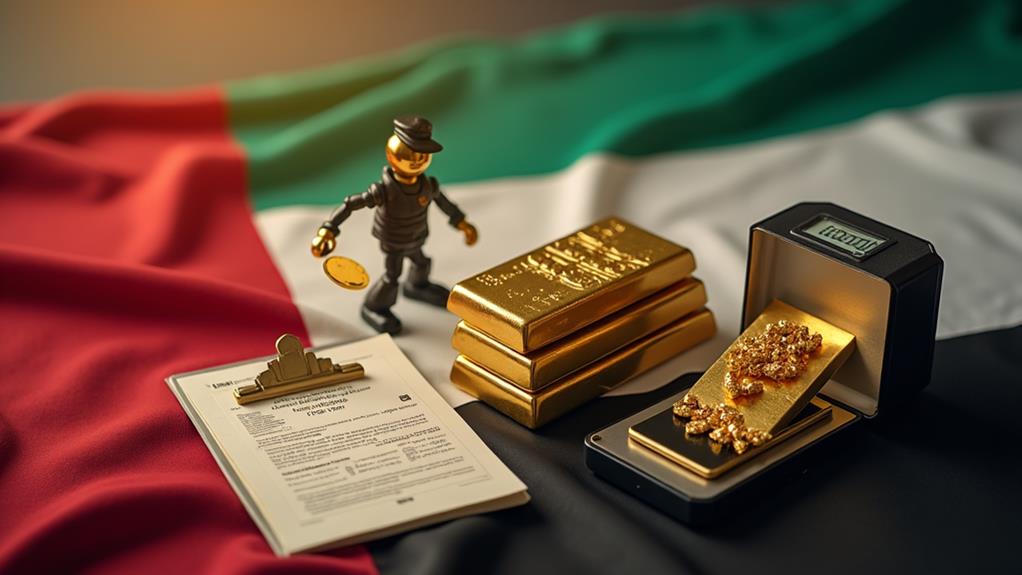The United Arab Emirates has established itself as a global hub for gold trading and investment, attracting investors from around the world with its strong regulatory framework and favorable market conditions. Understanding the complexities of UAE gold investment regulations is essential for those looking to capitalize on this lucrative market. From import procedures to taxation policies, the regulatory landscape encompasses a wide range of factors that can significantly impact investment strategies and outcomes. As the gold market continues to evolve, staying informed about these regulations becomes increasingly important for both seasoned investors and newcomers alike. What specific aspects of UAE gold regulations should investors prioritize?
Key Insights
- UAE gold investments are regulated by the Central Bank, DMCC, and FTA, requiring strict compliance with licensing and standards.
- Import and export of gold are subject to specific documentation, certification, and VAT requirements.
- A 5% VAT applies to gold purchases, with exemptions for exports to encourage international trade.
- No capital gains tax on gold investments makes the UAE an attractive market for investors.
- Strong investor protection policies include mandatory licensing, regular audits, and anti-money laundering regulations.
Gold Import Regulations

Several significant regulations govern the import of gold into the United Arab Emirates (UAE). The UAE Central Bank, Dubai Multi Commodities Centre (DMCC), and Federal Tax Authority (FTA) oversee these regulations.
Importers must adhere to strict gold bullion standards and comply with anti-money laundering (AML) laws and know your customer (KYC) regulations.
Key considerations for gold importers:
- Import and export duties on gold
- VAT on gold transactions
- Gold trading licenses requirements
- Gold investment compliance measures
Importers must obtain proper documentation and meet stringent quality standards.
The DMCC states, "All gold imports must comply with international responsible sourcing protocols."
Failure to adhere to these regulations can result in severe penalties.
It is vital for importers to stay informed about current regulations and seek professional direction to ensure full compliance with UAE gold import laws.
Documentation and Certification Requirements
Numerous documentation and certification requirements are essential for gold importers in the UAE. The Dubai Multi Commodities Centre (DMCC) and Federal Tax Authority (FTA) mandate strict compliance with gold investment regulations.
Importers must adhere to responsible sourcing protocols, implementing anti-money laundering and combating measures.
Key documentation includes:
- Import licenses
- Customs declarations
- Origin certificates
- Assay reports
The UAE Securities and Commodities Authority (SCA) oversees due diligence processes, ensuring importers conduct thorough customer due diligence.
Designated non-financial businesses must comply with the implementing regulation of decree law, which outlines specific requirements for gold transactions.
Importers are required to maintain detailed records of all gold-related activities, including:
- Transaction histories
- Supplier information
- Customer verification documents
Failure to meet these requirements can result in severe penalties, including fines and license revocation.
Storage and Security Guidelines

The UAE imposes stringent storage and security protocols for gold investments to safeguard the integrity of the precious metal market. These regulations apply to various forms of physical gold, including gold bullion, gold bars, and other precious metals and stones.
Investors must adhere to due diligence regulations throughout the supply chain to ensure compliance with gold market standards.
Storage facilities for gold investments must meet specific criteria:
- State-of-the-art security measures
- 24/7 surveillance systems
- Temperature-controlled environments
- Regular audits and inspections
Dr. Ahmed Al-Mansouri, a UAE gold market expert, states, "Proper storage is essential for maintaining the value and purity of gold investments. Investors should carefully select facilities that comply with UAE regulations to protect their assets."
Failure to comply with these recommendations may result in penalties and compromise the integrity of the gold investment.
Taxation on Gold Investments
The taxation landscape for gold investments in the UAE is multifaceted, with several important considerations for investors.
Value Added Tax (VAT) on gold purchases, capital gains implications, and import/export tax regulations all play vital roles in determining the overall profitability of gold investments in the region.
Understanding these tax aspects is fundamental for investors to make informed decisions and comply with UAE financial regulations.
VAT on Gold Purchases
Value Added Tax (VAT) considerations play a significant role in gold investments within the United Arab Emirates. The UAE implemented a 5% VAT on most goods and services in 2018, including gold purchases. Nevertheless, the government introduced a reverse charge system for wholesale gold and diamond trades to maintain the UAE's competitive edge in the precious metals market.
| VAT Implications | Investor Impact |
|---|---|
| 5% on retail purchases | Increased cost for small investors |
| Reverse charge for wholesale | Reduced tax burden for large trades |
| Exemptions for exports | Encourages international gold trade |
| VAT on fabrication charges | Additional cost for jewelry buyers |
Investors should be aware that while the VAT on gold purchases may affect retail prices, the UAE's tax-friendly environment and strategic location continue to make it an attractive hub for gold investments and trade.
Capital Gains Considerations
Investors eyeing gold opportunities in the UAE will find the capital gains tax environment particularly favorable. The UAE does not impose capital gains tax on gold investments, making it an attractive option for those seeking to maximize their return on investment.
Nonetheless, investors should be aware of other regulatory considerations:
- The Federal Tax Authority (FTA) oversees taxation matters in the UAE.
- The Dubai Financial Services Authority (DFSA) regulates financial services in the Dubai International Financial Centre.
- The UAE Securities and Commodities Authority (SCA) governs gold futures trading regulations.
While there's no capital gains tax, investors should consider:
- Investment fund structures and their impact on overall returns
- Alignment with personal investment goals
- The degree of risk associated with gold investments
It's essential to consult with financial advisors familiar with UAE gold investment regulations to ensure compliance and optimize investment strategies.
Import/Export Tax Implications
While capital gains considerations are favorable for gold investors in the UAE, understanding import and export tax implications is equally as significant. The Federal Tax Authority (FTA) oversees taxation on gold transactions, including imports and exports. Investors should be aware of the following essential points:
| Transaction Type | Tax Rate | Regulatory Body |
|---|---|---|
| Import | 5% VAT | FTA |
| Export | 0% VAT | FTA |
| Local Purchase | 5% VAT | FTA |
| DGCX Trading | 0% VAT | DGCX |
Foreign investors transporting gold from Dubai to India must comply with both UAE and Indian regulations. The Dubai Gold and Commodities Exchange (DGCX) plays a vital role in gold market regulation, influencing gold rates and supply. When dealing with gold bars and coins, investors should consider the current price of gold and potential tax implications to maximize their investment returns.
Export Procedures and Restrictions

The UAE enforces strict regulations on gold exports, requiring specific documentation and adherence to purity standards.
Exporters must obtain proper permits and certificates, including a certificate of origin and a valid export license, before shipping gold out of the country.
Furthermore, the UAE imposes limits on the quantity of gold that can be exported, with restrictions varying based on the exporter's status and the nature of the transaction.
Export Documentation Requirements
For gold exporters in the UAE, navigating the documentation requirements is a vital step in the export process. The Dubai Multi Commodities Centre (DMCC) and Dubai Gold and Commodities Exchange (DGCX) play significant roles in overseeing these procedures.
Exporters must comply with regulations set by the Federal Tax Authority (FTA) and UAE Securities and Commodities Authority (SCA).
Key documentation requirements include:
- Gold bar certification adhering to international standards
- Due diligence reports for responsible sourcing
- Combating the Financing of Terrorism (CFT) compliance forms
- Ministry of Economy approval for certain transactions
- DNFBP (Designated Non-Financial Businesses and Professions) registration
Exporters should carefully prepare these documents to avoid delays or rejections.
The UAE's stringent regulations aim to maintain the integrity of its gold trade while preventing illicit activities. Compliance with these requirements is non-negotiable for successful gold exports from the UAE.
Permitted Export Quantities
Exporters must not only comply with documentation requirements but also adhere to strict regulations concerning permitted export quantities.
The Dubai Multi Commodities Centre (DMCC) and Dubai Gold and Commodities Exchange (DGCX) oversee these regulations, ensuring compliance with international standards. The Federal Tax Authority (FTA) and UAE Securities and Commodities Authority (SCA) likewise play essential roles in monitoring gold exports.
Key points to consider:
- Gold coin regulations vary based on quantity and purpose
- Gold futures and options trading is subject to specific volume limits
- Dubai gold price fluctuations may impact permitted export quantities
Investors looking to export gold from the United Arab Emirates should familiarize themselves with these regulations to avoid potential legal issues.
The "Gold Era" initiative aims to strengthen the UAE's position in the global gold market, emphasizing the importance of adhering to export quantity restrictions.
Gold Purity Standards
Gold purity standards play a crucial role in UAE's export procedures and restrictions. The Dubai Multi Commodities Centre (DMCC) and Dubai Gold and Commodities Exchange (DGCX) work closely with the UAE Securities and Commodities Authority (SCA) to enforce strict purity requirements for gold exports.
Key standards include:
- Gold jewelry: Minimum 18 karat (75% pure)
- Gold coins and bars: 99.5% purity or higher
- Dubai Gold Souk: Adheres to international benchmarks
The Emirates Gold Bullion Committee oversees compliance, ensuring dealers in precious metals meet these standards. Exporters must obtain certification from accredited laboratories before shipping.
Non-compliance can result in severe penalties, including license revocation.
These rigorous standards maintain UAE's reputation as a trusted gold trading hub, protecting consumers and investors while facilitating legitimate international trade in gold products.
Market Transparency Measures
How does the UAE ensure transparency in its gold market? The Dubai Gold and Commodities Exchange (DGCX), Dubai Financial Services Authority (DFSA), and UAE Securities and Commodities Authority (SCA) play essential roles in maintaining market integrity.
These regulatory bodies implement strict measures to mitigate risks and ensure fair market prices.
Key transparency measures include:
- Mandatory licensing for gold traders and dealers
- Regular audits of investment firms
- Regulations for gold ETFs
- Real-time price reporting
Dr. Ahmed Al-Mansoori, financial expert, states: "Transparency is vital for investor confidence. The UAE's strong regulatory framework ensures that buy and sell transactions are conducted fairly and openly."
These measures help protect investors and maintain the UAE's reputation as a trusted gold trading hub.
Nevertheless, investors should still exercise caution and conduct due diligence before engaging in gold transactions.
Investor Protection Policies

Building upon the transparency measures, the UAE has implemented strong investor protection policies to safeguard individuals and institutions involved in gold investments.
The Dubai Multi Commodities Centre (DMCC) and Dubai Gold and Commodities Exchange (DGCX) work closely with regulatory bodies like the Federal Tax Authority (FTA), Dubai Financial Services Authority (DFSA), and UAE Securities and Commodities Authority (SCA) to ensure investor safety.
Key protective measures include:
- Strict anti-money laundering and combating the financing of terrorism regulations
- Mandatory registration and licensing for gold traders
- Regular audits and inspections of gold trading facilities
- Investor education programs on risks associated with investing in physical gold
These policies aim to create a secure environment for gold investments while deterring illegal activities.
Investors are advised to conduct thorough due diligence and work with licensed organizations to minimize risks in the UAE gold market.
My Final Thoughts
UAE gold investment regulations form a comprehensive framework designed to ensure market integrity and investor protection. With the UAE accounting for 11% of global gold trade, adherence to strict import, documentation, and security protocols is vital. The tax-free environment attracts investors, while transparency measures and regular audits bolster confidence. Understanding these regulations is fundamental for navigating the UAE's gold market successfully and mitigating potential risks. Continuous education and compliance remain pivotal for all stakeholders in this dynamic sector.







